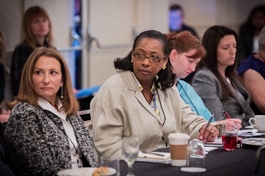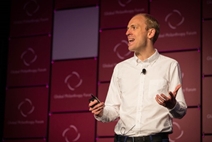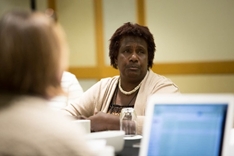By Kate Chadwick

Members of the East Bay Center for the Performing Arts at GPF 2016
Credit: Global Philanthropy Forum
The 2016 Global Philanthropy Forum took place on April 4th through 6th in Redwood City, California. A mix of donors, humanitarian aid actors, development practitioners, government officials, and corporate representatives descended on Silicon Valley in the hopes of sharing knowledge and igniting partnerships to address the current migrant crisis taking place globally. Whether for security, economic, political, cultural or environmental reasons, currently 250 million people are on the move globally. Sixty million of those individuals are migrating in search of safety.
As a Berkeley-Haas CSSL Philanthropy Fellow with The David & Lucile Packard Foundation, and UC Berkeley Master of Development Practice (MDP) alumna, I had the opportunity to attend the Forum. Together, conference participants tackled issues such as peace & security, humanitarian assistance & refugees, and strategic philanthropy. Session themes like “Philanthropy’s Role: Solving for Crisis While Taking the Long View” cross-cut sectors, requiring multi-dimensional solutions. Donors explained how they partner with civil society organizations to respond to crises, including the current wave of migrants fleeing Syria, Afghanistan, Iraq, Eritrea, and other countries, while also addressing the associated development issues such as education, health & nutrition, and food security. At the same time, field-based aid and development practitioners described their first-hand experiences providing essential support services to individuals and communities forced to migrate, or forced to consider migration as a means for survival.
Aid and Development Organizations Must Collaborate

Haas Philanthropy Fellow, Kate Chadwick (far right), participates in the 2016 Global Philanthropy Forum.
Credit: Global Philanthropy Forum
One major theme emerging from the conference was the need for better collaboration between aid and development organizations to create sustainable solutions to migration challenges. Professor Alexander Betts, the Leopold Muller Professor of Forced Migration and International Affairs and Director of the Refugee Studies Centre at the University of Oxford, discussed his work on ‘refugees as a resource’, and the fact that most refugees have an alternative source of income and are not fully dependent on international aid. Professor Betts suggests an innovative solution to humanitarian aid contexts that blur into development challenges, specifically related to long-term refugee situations. That solution is incubator cities made up of semi-permanent infrastructure designed to provide housing, health, educational and economic support services and opportunities to populations in transition. Professor Betts’ inspiration for such cities are university campuses, which manage a fluctuating and transitioning population annually.

Professor Alexander Betts discusses meeting the immediate and long-term needs of the displaced.
Credit: Global Philanthropy Forum
Proposed solutions such as those provided by Professor Betts cannot be left to aid and development practitioners alone. There is a necessary role for donors, governments, corporations, and civil society actors, as well. The organizers of the Forum, the World Affairs Council, had the foresight to provide seats for all such actors at the conference table. Relatedly, it was suggested that one major role of philanthropy is that of the convener; or in other words, to support civil society organizations while bringing together major players such as businesses and government agencies to jointly tackle social and environmental issues.
Local Support is Key to Overall Success
Another common theme that emerged from the Forum was the immense benefit of participation by local community members in developing and managing community driven solutions to migration challenges. It was proposed that all parties working to address such issues should engage and include the local voice from the very start in the design phase of a project. One such participant of the Forum was Ursula Rakova, Executive Director of Tulele Peisa, a local non-governmental organization (NGO) working to relocate Tulun/Carterets Atoll Islanders who are currently threatened by rising sea levels associated with climate change.

Ursula Rakova discusses the plight of climate refugees.
Credit: Global Philanthropy Forum
Ms. Rakova gave an emotional account of the work conducted by local community members in her birthplace, with support of the Catholic Church and other local and international NGOs, to relocate and resettle the island population to the nearby Papua New Guinea mainland. Participating in the conference gave Ms. Rakova an opportunity to share her story, and learn from and connect with other organizations also working on climate mitigation and adaptation strategies. The need for all actors working on such issues to anticipate, mitigate, and adapt to social and environmental crises was another overarching theme of the conference. In addition to climate mitigation and adaptation, other examples of organizations anticipating versus simply responding to crises, include conflict resolution and building systems of effective governance.
The Need for a Social Impact Infrastructure
Additional major conference themes as summarized by Forum President and CEO, Jane Wales, include: building/nurturing/sustaining the infrastructure of social impact that includes a vibrant civil society; the role of youth and the need to invest in them across all conference issue areas; the importance of the open data movement as it relates to program evaluation and sector learning; and that the ultimate role of philanthropy should be to provide people with dignity.
“The ultimate role of philanthropy should be to provide people with dignity.”

Global Philanthropy Forum President and CEO, Jane Wales, welcomes Forum participants to the stage.
Credit: Global Philanthropy Forum
As the Forum was organized around the overarching topic of global philanthropy, the multiple roles of philanthropy were discussed throughout the event, including:
- providing financial resources to civil society organizations;
- convening major players to address social and environmental challenges;
- advancing the democratic process;
- providing rigorous monitoring & evaluation of interventions and open data;
- supporting the capacity building of local organizations;
- acting as a laboratory for social justice;
- incubating and accelerating solutions to social and environmental challenges;
- integrating culture into such solutions;
- providing a voice for civil society through advocacy grantmaking and participatory research design;
- supporting innovation and entrepreneurship;
- developing human capital through management and training;
- acting as an endorser to attract additional investments towards potential solutions; and
- as it was stated several times over the course of the Forum, the idea that ultimately, foundations have the capacity to take on risk and thus, take on the role of risk-taker.
As a former humanitarian aid actor, development practitioner, and now grantmaker, it was an honor to participate in a conference that brought together so many like-minded individuals to share their knowledge and experience. Ultimately, woven through my own career is the thread of positive social and environmental impact, and I felt that that thread was stripped apart and thoroughly examined at the Forum.
 As readers of the CSSL blog, you’ve seen our recent work as the global launch partner for
As readers of the CSSL blog, you’ve seen our recent work as the global launch partner for 
 The 2016
The 2016 





